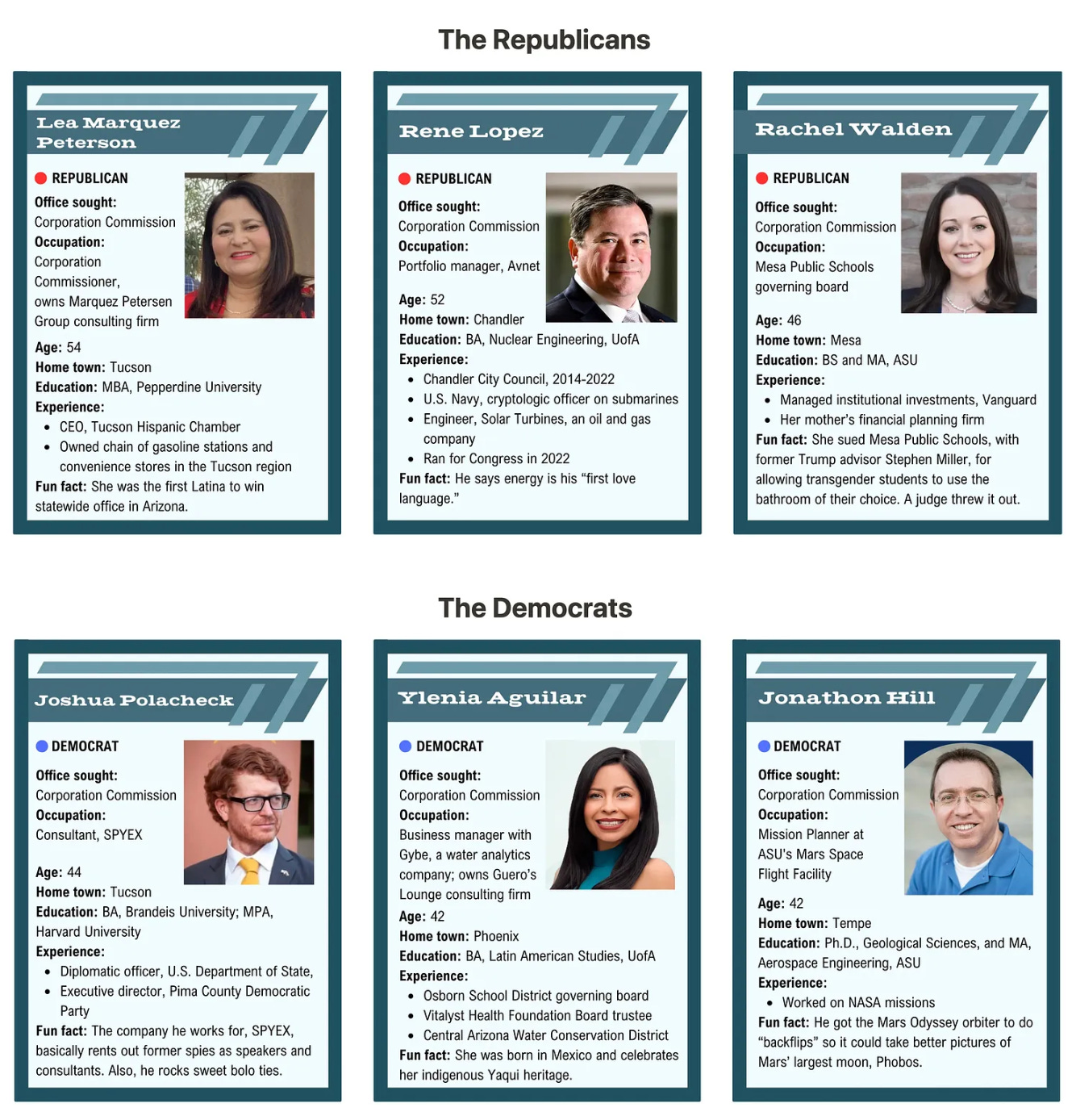Don't forget the regulator races
The ACC wields lots of power over power ... Tucsonans on the ballot ... VP candidates talk immigration in Tucson.
This November, three of the five seats on the Arizona Corporation Commission are up for grabs.
Whether you’re a customer of Tucson Electric Power, Arizona Public Service, or any other regulated utility, these elections are going to hit you in your pocketbook on a daily basis.
Plus, this is a rare moment when Tucsonans could send one (or two) of their own to statewide office. Both Democratic newcomer Joshua Polacheck and incumbent Republican Lea Márquez Peterson hail from Tucson.
Right now, the commission is made up of four Republicans and one Democrat. Three Republicans and three Democrats are running this year for four-year terms.
Wait — what does the ACC do again?
Back in August I presented a deep dive into the history, powers, and controversies of Arizona’s “fourth branch of government.”
Let’s recap.
The commission was established by the Arizona Constitution back in 1912.
Their headline-grabbing activities are prosecuting investment securities fraud and regulating the energy and water utilities we rely on every day.
Their less-interesting but still-important duties include regulating sectors like railroads, telecommunications, pipeline infrastructure, and the registration of all corporations in the state.
Over the last decade and change, the ACC has increasingly faced accusations of “regulatory capture,” meaning these regulators are being unduly influenced by the entities they’re in charge of regulating.
There are stories of revolving doors between the commission and industry lobbyist firms, large utilities like APS funding the campaigns of friendly candidates with dark money, and commissioners making trips to New York where they promise the world to industry execs and investors.
How bad is it getting?
So bad that we need watchdogs for our watchdogs. In 1983, Arizona created the Residential Utility Consumer Office, a state agency tasked with explicitly representing ratepayers in ACC proceedings. And RUCO opposed all seven of the major utility rate case decisions the ACC made in the last two years, 12NEWS reports.
A former ACC Chair, Republican Bob Burns, has spoken out about problems with the current commission’s ethics and transparency with the public.
“If you have unethical commissioners, one of the most serious things that can happen is you end up with a captured commission, captured by the utility, and the protection of the ratepayer goes out of window,” Burns said.
Even one of the current ACC commissioners is calling for enforceable ethical standards, but is being opposed by the majority of the body.
And why do ratepayers need protection? Could a little rate adjustment here or there really be a big deal?
Well, Arizonans who get their electricity from the Salt River Project utility, which is not regulated by the ACC because they’re technically an “irrigation district,” pay 20% less than ratepayers of utilities regulated by the ACC, for example.
And last year, the ACC settled a case with APS by allowing the utility to add a surcharge to customers’ bills to subsidize costs for the Four Corners Power Plant, while New Mexico’s regulators had their utilities, which draw power from the same plant, lower their customers’ rates.
Do you want more solar?
It's a point of debate whether sustainability and climate change should factor into the ACC’s charge of protecting Arizona consumers.
But the reality is that the commissioners greatly influence the adoption of renewable energy when they, for instance, determine rates for rooftop solar customers who are tied into utility energy grids.
Differences in these rates have led SRP to having a third as many rooftop solar customers as APS even though they have roughly the same number of total customers.
But the ACC currently has an open rate case which could create a flat fee for APS’s rooftop solar customers and disincentivize customers from adopting solar.
The commission also approves the rates at which utilities buy energy supplied by their rooftop solar customers — an issue that can make or break the economics of financing a home solar system.
So study up, because the only way to rescue the Arizona Corporation Commission, and our utility rates, from its regulatory capture is with voter power.
Dueling visions: At competing campaign events in Tucson yesterday, vice presidential candidate JD Vance blamed migrants for most of the problems in the country during a rally at the Tucson Speedway racetrack. Tim Walz, at a rally at Palo Verde High Magnet School, said Vance would rather blame migrants than come up with solutions of his own, the Tucson Sentinel’s Natalie Robbins and Paul Ingram report.
Planning ahead: Pima County officials laid out the steps they’ve taken to make sure the local election system is secure, the Arizona Luminaria’s John Washington reports. Elections officials gave a presentation at the Tucson City Council’s meeting Tuesday, showing live camera feeds, steel cages, vaults, backup generators, and an array of other measures in place for the November 5 election.
Looking for options: The Tucson City Council voted unanimously to agree to pay higher rates to house people at the Pima County jail, the Sentinel’s Natalie Robbins reports. The booking fee charged by the county is going up $100 and daily housing costs are up about $17. City officials explored the idea of sending arrestees to the Santa Cruz or Pinal County jails, but the cost and logistics were too much, Councilman Paul Cunningham said. The city also is exploring other solutions, like a city-operated holding area with a virtual courtroom.
Call to the public: Tucson officials want feedback from the public about the Bus Rapid Transit locations along Stone Avenue. They’re offering a survey, which closes December 31, to see where stations should be placed along the corridor stretching from the Tohono Tadai Transit Center/Tucson Mall to the Ronstadt Transit Center downtown. You can fill out the survey here.
Movie time: This is Tucson’s Pascal Albright has the skinny on what’s playing at the Loft Cinema’s Film Fest, which starts next Wednesday and runs for nine days. It’s the 14th year of the festival and will feature lifetime achievement awards for Indigenous actors Graham Greene and Tantoo Cardinal.
Fading away: In other local cinema news, the only movie theater in the Green Valley/Sahuarita area is up for sale, the Green Valley News’ Kim Smith reports. The Desert Sky 6 Cinema couldn’t compete with streaming services and likely will be demolished after the sale.
108: The days in Tucson where the temperature hit triple-digits, including yesterday. That ties the record set in 2020.












Thx for an informative article on the ACC. Most voters have no idea what the ACC does nor do they realize that its being captured by utilities that it regulates means Arizonans' costs go up unnecessarily. Will share this with friends and neighbors to encourage their voting for commissioners who will seriously work on behalf of the Arizonans they are supposed to serve.